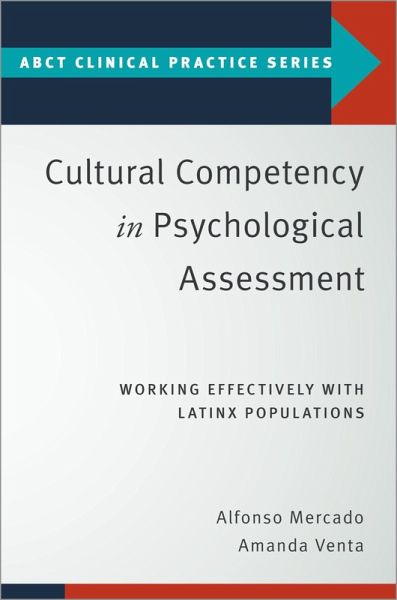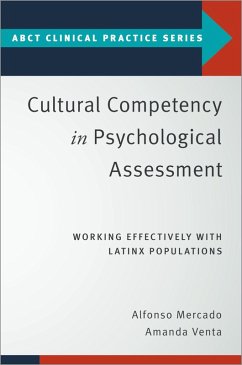
Cultural Competency in Psychological Assessment (eBook, PDF)
Working Effectively With Latinx Populations

PAYBACK Punkte
9 °P sammeln!
The Latinx population has experienced fast growth and is highly diverse, for example, in terms of immigration status, being born in the United States or other countries of origin, cultural variation, skin color, and language preference. Access to linguistically and culturally relevant services is crucial yet extremely limited. Assessment is an essential aspect of ethical mental health practice and has significant implications at the time it is conducted as well as in the future. Cultural Competency in Psychological Assessment: Working Effectively with Latinx Populations focuses on the practica...
The Latinx population has experienced fast growth and is highly diverse, for example, in terms of immigration status, being born in the United States or other countries of origin, cultural variation, skin color, and language preference. Access to linguistically and culturally relevant services is crucial yet extremely limited. Assessment is an essential aspect of ethical mental health practice and has significant implications at the time it is conducted as well as in the future. Cultural Competency in Psychological Assessment: Working Effectively with Latinx Populations focuses on the practical application of culturally informed assessment approaches with Latinx persons in mental health settings. Drs. Mercado and Venta discuss the mental health needs of the Latinx population and provide guidance on the best practices to use when working with this cultural group, such as incorporating cultural humility and cultural awareness in psychological assessments and using cultural clinical interview techniques. Latinx cultural values, cultural conceptualization, and clinical implications for working with Latinx patients are discussed at length. Cultural Competency in Psychological Assessment also covers topics such as linguistic considerations, working with interpreters, dealing with prejudice and microaggressions, working with undocumented and immigrant clients including children, and recommendations for future research. This book is a resource of clinical utility for psychologists and other mental health practitioners working with the Latinx community as well as for graduate students in psychology and psychiatry residents.
Dieser Download kann aus rechtlichen Gründen nur mit Rechnungsadresse in A, B, BG, CY, CZ, D, DK, EW, E, FIN, F, GR, HR, H, IRL, I, LT, L, LR, M, NL, PL, P, R, S, SLO, SK ausgeliefert werden.













